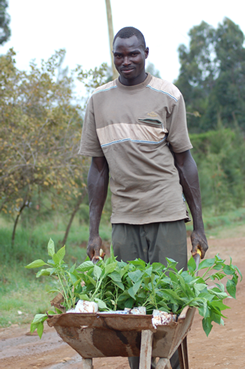Nutrition: The HAART and Harvest Initiative

When Indiana University and Moi University (Kenya) physicians responded to the AIDS pandemic in Africa by creating the Academic Model for Prevention and Treatment of HIV/AIDS (AMPATH), they discovered that provision of anti-retroviral drugs and support for their safe administration, while the core of HIV treatment, can not fully solve many of their patients’ problems.
The majority of patients cared for by AMPATH are among the poorest in the world. Sick themselves and lacking basic human necessities, many patients have lost their spouse to the disease. Most patients are the sole support for multiple vulnerable children. Owing to the stigma of HIV/AIDS that still endures in many regions of western Kenya, patients are often cut off from their family networks when they discover their HIV status and lose their jobs for fear of spreading the disease or being unable to work. Others are too sick to tend to their subsistence farms.
AMPATH provides food support to its most vulnerable patients and their dependents. All new patients entering AMPATH are screened by a nutritionist and those found to be food insecure are provided with a nutrition prescription assuring access to 100% of daily nutrition requirements. Food support covers the index patient and all dependents “eating from the same pot.” This period of intensive feeding lasts for six months, i.e. during the patient’s initial period of antiretroviral drug treatment and immune reconstitution.
After six months the majority of patients are expected to provide for themselves. Any remaining patients determined unable to manage their food needs are eligible to enter a weaning program which gives them access to 50% of daily food requirements along with training through the Family Preservation Initiative aimed at enhancing long term food security.
Back to IU-Kenya Partnership main page
Adapted with permission from the IU Kenya website, February 2009.